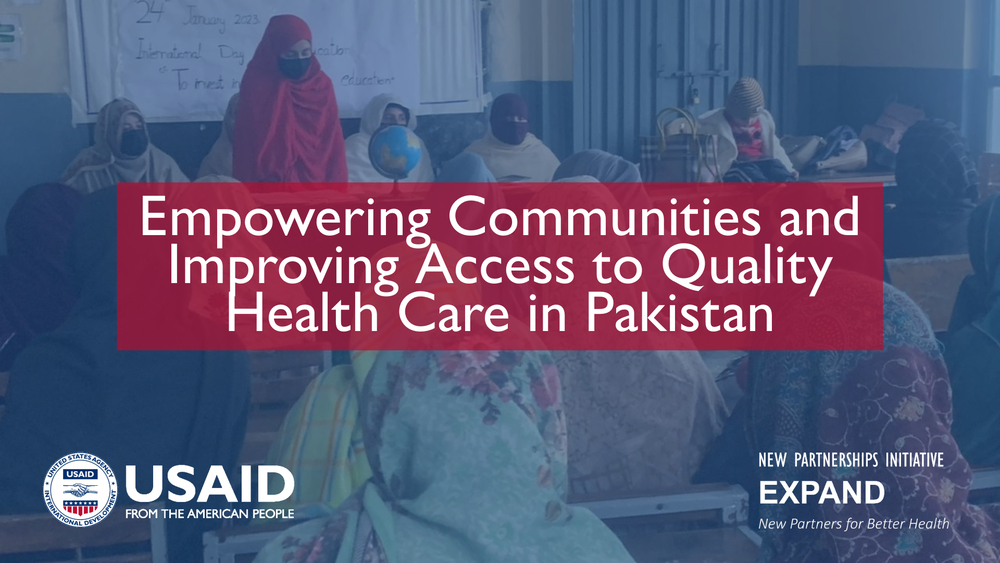Empowering Communities and Improving Access to Quality Health Care in Pakistan
October 28, 2024

In the rural areas of District Buner, Khyber Pakhtunkhwa (KP) province, Pakistan, the USAID-funded New Partnerships Initiative EXPAND: New Partners for Better Health (NPI EXPAND) Human Development Activity (HDA) supported the revitalization of community-based healthcare delivery for improved access to and utilization of quality family planning (FP) and maternal, newborn and child health (MNCH).
In Buner, only 44% of births are attended by skilled birth attendants, compared to 71% in urban areas. Individuals living in hard-to-reach areas face significant barriers to access basic services,including healthcare, education, and social inclusion. Social and cultural norms restrict women’s mobility and decision-making, particularly in seeking healthcare. Primary healthcare units are often located far from many villages, making it difficult for women to access essential FP and MNCH services. Recognizing these challenges, USAID, through the NPI EXPAND HDA initiative, teamed up with the Saibaan Development Organization (SDO) to change this scenario.
SDO conducted a situational analysis in District Buner to identify key barriers to implementing community-based healthcare delivery. The identified barriers included delays in community-based healthcare, lack of community engagement, inadequate community-based infrastructure, and insufficient capacities of service providers, stockouts of medical supplies, and limited use of data for service planning.
Using the results of this analysis, SDO, in partnership with the Department of Health and Population Welfare in Pakistan, formulated and executed a comprehensive strategy to enhanceaccess to health services in rural areas. SDO and the Department of Health and Population Welfare developed joint action plans for integrated services to expand MNCH and FP services, impement capacity building initiatives, mobilize communities, and conduct health education and awareness sessions. The project strengthened the capacity of 30 facility-based and 80 community-based healthcare providers on various health topics, adapted and reprinted educational materials, and involved community members and religious leaders in disseminatinghealth messages.
SDO engaged key stakeholders, including government agencies, local communities, healthcare providers, and other relevant organizations. Partnerships and collaborations were established to leverage resources and expertise. Civic engagement platforms such as Primary Healthcare Management Committees and Village Health Committees were activated, key community influentials like mosque imams were engaged and periodic coordination meetings were held with stakeholders to ensure active participation and buy-in throughout the project cycle.
Community members including mosque imams, influential community members and youth were also engaged to communicate and deliver key health and family planning messages.
From October 2023 to January 2024, SDO organized 60 outreach events, providing diagnostic, counseling, and treatment services to 55,934 individuals, including 11,245 individuals at the outreach events.
The project provided MNCH services to 26,667 individuals and FP services to 4,359 individuals. This includes reaching 7,453 MNCH and 728 FP individuals through outreach events. Health education and awareness sessions reached 82,129 individuals through 1,087 group sessions, including 200 women’s support group meetings.
The project’s sustainability strategy was designed to ensure long-term impact through improved and sustained access to information and integrated community-based healthcare delivery. Enhanced community mobilization and civic engagement increased demand for healthcare services, supported by strong health system commitment to engage the community members and organized outreach activities. The project strengthened the capacity of healthcare providers and revitalized civic engagement platforms to improve service provision and advocate for ongoing health improvements. This comprehensive approach ensured both immediate benefits and a foundation for sustained community health advancements.
The project sowed the seeds of sustainability. Institutionalized community engagement platforms, once dormant, sprung back to life, amplifying the voices of the marginalized. Through training and mentorship, healthcare providers evolved into champions of change, equipped with the skills to navigate the complex landscape of maternal and child health. Overall, the project significantly contributed to improving access to and availability of MNCH and FP services by revitalizing community-based healthcare delivery.